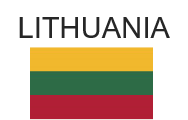This table here below aims at providing an overview of all the initiatives, such as the political communications, guidelines, and legislation, related to interoperability that have been put in place in Lithuania.

National Interoperability Framework
The National Interoperability Framework (NIF) is a set of standards, policies, and guidelines that ensure that information and communication technology (ICT) systems can communicate and share data seamlessly. It promotes the development of interoperable systems that facilitate data exchange and collaboration between different organizations and levels of government. The NIF provides a common language and a framework for ensuring that ICT solutions are compatible, secure, and reliable, which enhances the efficiency of public services and improves citizen outcomes.
|
Baseline for a National Interoperability Framework Year: 2021 |
In 2021, the State Digitalisation Development Programme for 2021–2030 was approved. According to the programme, one of the priorities in the field of digitalisation is consolidating State information resources, and IT infrastructure and services. In this context, the programme ensures precisely further consolidation of the State’s information resources infrastructure, as well as the interoperability of State information resources. Concerning the National Interoperability Framework (NIF), Lithuania has no formal document focused on it. However, Lithuania included its approach towards interoperability in the State Digitalisation Development Programme for 2021–2030, in the State Information Resources Management Law and the State Information Resources Interoperability Platform (SIRIP) itself. |
Good Practices
This section provides examples at the national level in line with a selection of different thematic areas of the European Interoperability Framework (EIF). Further initiatives and good practices are available in the country’s Digital Public Administration Factsheet.
Lithuania approved its National Digitisation Development Programme 2021-2030 which foresees that particular attention should also be paid to the legal regulation of open standards.
The State Information Resources Interoperability Platform (SIRIP) is the multifunctional platform ensuring the provision of public and administrative electronic services on a 'one-stop-shop' basis through a central eGovernment portal and seeking to achieve the state information resources' functional, technical, and semantic interoperability. SIRIP is a system that delivers centralised access to public services: it is a convenient electronic platform that offers an easy way for public administrations to design, deliver, and manage digital services, and it is also a universally accessible virtual space where these services can be requested. SIRIP provides the possibility to determine the identity of service users in a flexible, safe, and reliable way. System users can connect using a mobile or electronic signature, EU identity cards or electronic banking systems. It also enables recipients to pay for services in a safe and convenient manner through different payment methods, while allowing external systems to perform and administer them in the SIRIP space. SIRIP has developed one modernised and three new compound digital services according to life events such as birth of a child, losing and finding a job, moving or preparing to move to another country, and starting farming. Such services are user-oriented, proactive, and designed according to the Once-Only principle, and they have been available for citizens using the eGovernment Gateway portal since March 2023.
Legislative drafts that identify new or change existing business processes are coordinated with institutions involved in the provision of the services and other stakeholders. For business process modelling, Business Process Modelling Notation or Unified Modelling Language (UML) Diagrams modelling techniques are used.

